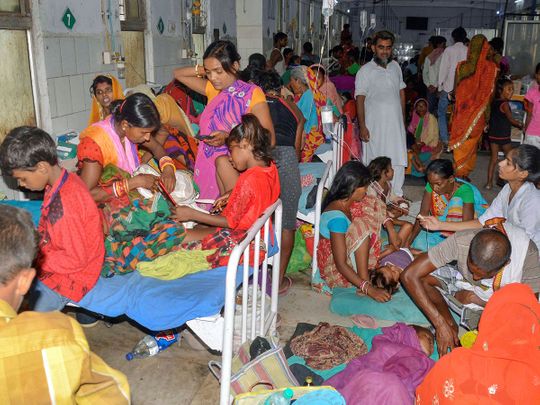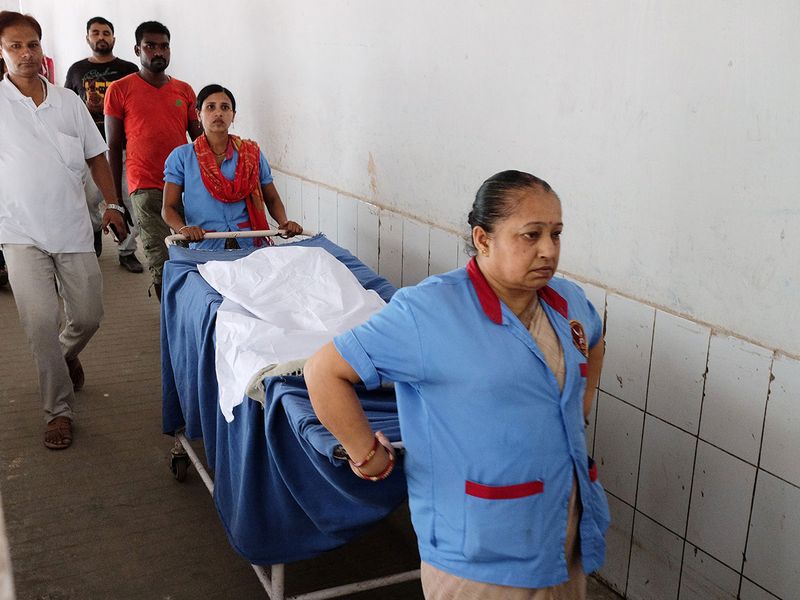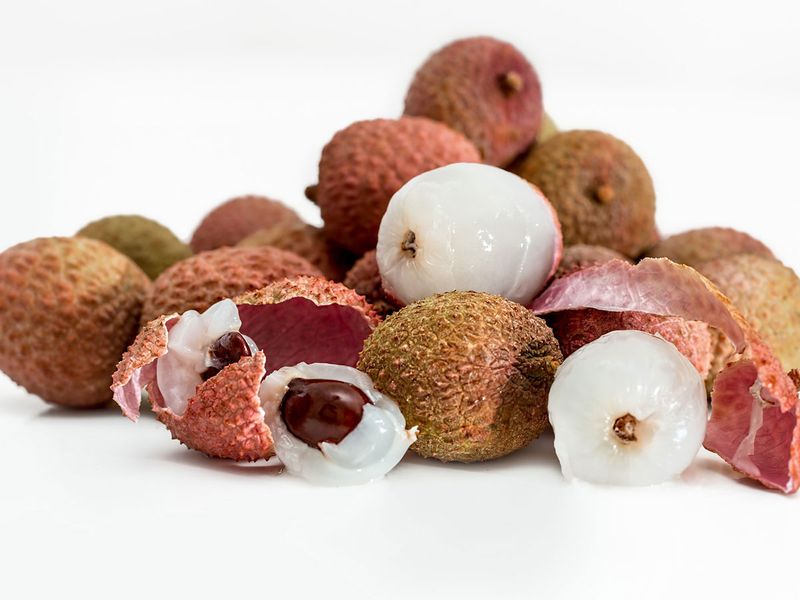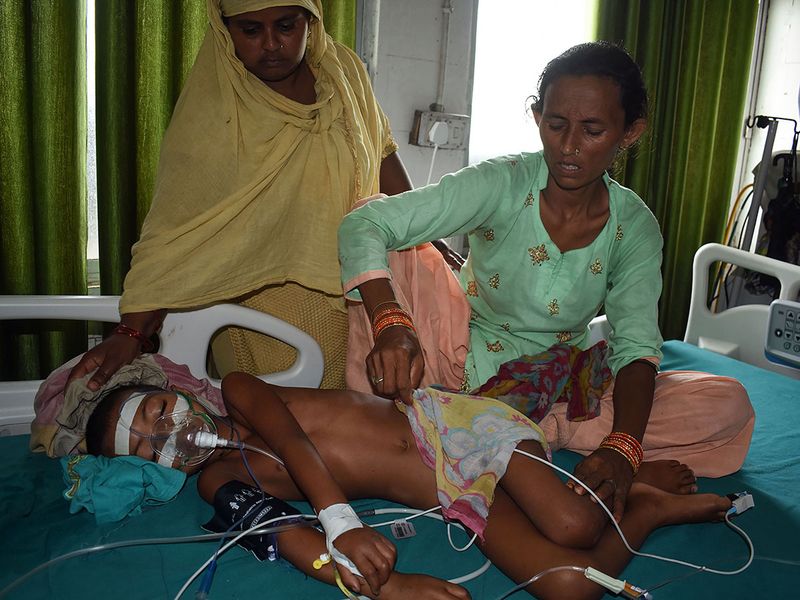
Muzaffarpur, India: The stench of urine, chlorine, vomit and death fill the main hospital in Muzaffarpur, the epicentre of a brain fever outbreak in India that has killed more than 100 children since June 1.
Doctors are not sure what the cause is, but one theory is that the culprit is a toxin found in lychees eaten by children of poor families who go to bed with empty stomachs.
One of the distraught parents crowding the chaotic corridors of the Sri Krishna Medical College and Hospital (SKMCH) is Dilip Sahni, 25, a construction worker and father of three.
He brought his four-and-a-half-year-old daughter Muskan early in the morning, only 24 hours after she fell ill, to SKMCH. There almost 100 other children are being treated, many sharing beds.
"When her mother went in to wake her yesterday at 11 am, she was shocked to see her hands and legs tightened and her teeth sticking together," Sahni told AFP.
"Her mother started screaming for help, and we rushed her to the Kejriwal hospital. At midnight the hospital doctors told us to take her to SKMCH," he said.
"Early morning we shifted her here but her condition has been deteriorating," Sahni said before breaking down.
Not long afterwards came the news that little Muskan had died.
The night before she had eaten bread, she did not have any lychees. It was 10 days ago she had the fruit.
She was very likely just the latest victim in a health crisis blamed on Acute Encephalitis Syndrome (AES) in the dirt-poor, baking hot eastern state of Bihar.
The onset is lightning fast, its young victims quickly developing a high fever, seizures, and vomiting. All often, if treatment is not swift, leading to death.
A total of 128 have died so far.
"Obviously it is tough to make ends meet and raise three children. But I try my best. She was a healthy and playful child," Sahni had said when he had brought his daughter in.
"The night before she had eaten bread, she did not have any lychees. It was 10 days ago she had the fruit," he said.
'Dying with worry'
As the hospital guards scream at parents not to crowd the wards, Raju Kumar, 35, a father of five, has just admitted his two-and-half-year-old son to the intensive care unit.
"I am dying with worry. So many dead bodies of little children I have seen standing here. I am just praying my son is saved somehow," Kumar, a shopkeeper, told AFP.
"He fell unconscious suddenly the day before yesterday. We rushed him here immediately," he says, holding his four-month-old baby in his arms.

Another being admitted is Krimta Kumari, a girl around nine years old sat on her father's lap in a yellow T-shirt, visibly flushed with fever and unable to keep her eyes open or speak properly.
Just then, there is a power cut, leaving mothers in colourful saris and gold nose studs to try and cool their sick children in the sweltering hospital with hand-held fans.
Bihar, home to almost 100 million people, has also been hit by a heatwave, with temperatures of 45 degrees Celsius (113 Fahrenheit) killing 184 people this summer - including 78 since Saturday.
Sleepless nights
Not only is Bihar poor, its healthcare system is in a dire state. For every 100,000 people there are fewer than two health workers, compared to the average for India of around nine, according to the Hindustan Times daily.
"We as doctors are trying our best to save the lives of as many children as possible," said Srikant Prasad Bharti, an overworked junior paediatric doctor at the SKMCH.
"No one talks about how many sleepless nights we have been spending to look after the sick kids. No one is talking about the children who have been cured. It is easy to blame hospitals and doctors," he complained.
Per 100,000
people there are fewer than two health workers in Bihar.This is not the first outbreak of AES in Bihar. But fatalities - until this year - had fallen sharply since 2014, when 355 children died. There were just 33 deaths last year, the Hindustan Times reported.
"This is happening because the children come from very poor socio-economic backgrounds. The parents couldn't care less whether their children have taken their meals or not," Bharti says.
"The children wander around in heat and eat rotten or unripe lychee and go to bed on empty stomachs. This leads to a sudden drop in blood sugar levels and leads to seizures and convulsions."
Frequently asked questions
What is encephalitis?
Encephalitis is an inflammation of the brain, caused by any one of a number of viruses.
Early symptoms can be similar to those of flu, with patients suffering from high temperatures or headaches. But symptoms can worsen within hours, and can include serious complications like seizures, paralysis and coma.
In Bihar, children were typically taken to hospital with fevers.
How could lychees cause sickness?

Researchers who conduced a study of 390 children who fell sick in 2014 in Muzaffarpur said that lychees contained hypoglycin A, an amino acid that can disrupt metabolism, lowering blood sugar levels. That can trigger hypoglycaemia, and in extreme cases, death.
The study by India's National Centre for Disease Control and the US Centers for Disease Control and Prevention, added that when the brain lacks glucose, it turns to other sources of energy, which are rapidly depleted, eventually pushing people into coma.
"The synergistic combination of (lychee) consumption, a missed evening meal, and other potential factors such as poor nutritional status, eating a greater number of litchis, and as yet unidentified genetic differences might be needed to produce this illness," the researchers said in their study, which was published in the Lancet in 2017.
Retired virologist T. Jacob John also raised the possibility that encephalitis cases in Muzaffarpur could be associated with lychees in a 2014 study published by Indian science journal Current Science. Muzaffarpur is a major hub for growing lychees, which ripen at this time of year.
Any other hypotheses?
Doctors and officials are testing children for a variety of conditions and many are divided on the cause of the disease.
But dehydration as a heat wave sweeps India could be to blame, according to medical staff in Muzaffarpur.

"In my observation it is nothing but an epidemic of heatstroke," said Gopal Shankar Sahni, the head of the Sri Krishna Medical College and Hospital's paediatric department.
Still, another doctor visiting Muzaffarpur from India's financial capital of Mumbai said eating lychees could exacerbate dehydration symptoms.
In my observation it is nothing but an epidemic of heatstroke.
"The child is hypoglycaemic and if they eat them it gets worse," said Ravikant Singh.
How are authorities reacting?
Officials are scrambling to contain the outbreak, but victims' relatives say poor hospital facilities have allowed the death toll to balloon.
Two lawyers have filed a petition to the Supreme Court criticising government "inaction", citing an inadequate number of doctors and hospital beds, according to a report by Reuters partner ANI.
Meanwhile, Nitish Kumar, the chief minister of the state, has refused to comment.
District magistrate Ghosh told Reuters officials were running door-to-door awareness campaigns in villages by asking people to stay clean and hydrated. Other officials are ensuring children get sweets at breakfast to maintain glucose levels.
Health Minister Harsh Vardhan has sent special teams of paediatricians and paramedics to Bihar, and also made 10 ambulances available.
Meanwhile, Congress described the deaths of children in Bihar due to AES as a "national tragedy," saying that the Centre and state government were insensitive and unprepared.
Congress MP Gaurav Gogoi said, "What is happening today in Bihar is a national tragedy and national horror as over 150 children have died. The perpetrators of this tragedy is the state and the Central government."












